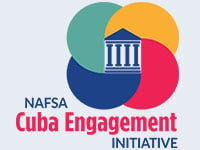 In late 2014, President Obama announced that the United States would be charting a new course on Cuba. The news was warmly welcomed by proponents of education diplomacy who had been advocating for improved policies to support U.S.-Cuba relations for a decade. To mark the one-year anniversary of the president’s historic announcement, NAFSA launched the NAFSA Cuba Engagement Initiative, building on the organization’s longstanding focus on Latin America and Cuba, and redoubling its commitment to the use of academic partnerships for the United States and Cuba to more effectively engage with, and learn from, one another.
In late 2014, President Obama announced that the United States would be charting a new course on Cuba. The news was warmly welcomed by proponents of education diplomacy who had been advocating for improved policies to support U.S.-Cuba relations for a decade. To mark the one-year anniversary of the president’s historic announcement, NAFSA launched the NAFSA Cuba Engagement Initiative, building on the organization’s longstanding focus on Latin America and Cuba, and redoubling its commitment to the use of academic partnerships for the United States and Cuba to more effectively engage with, and learn from, one another.
As international educators, we are proud to see exchanges featured so prominently as a key diplomacy tool for improving relations between Cuba and the United States. Despite these administrative advancements, the president can only act within the bounds of the law, which means that these policy changes are regulatory only. Our new era of normalization cannot be made permanent until Congress acts to repeal the embargo and end the travel ban to Cuba for U.S. citizens. As international educators work tirelessly to build sustainable partnerships between U.S. and Cuban institutions, the laws that dictate our policies undercut our efforts. We cannot be a globally engaged United States while the outdated embargo on Cuba is still in place.
In my last blog post, I offered five reasons why ending the U.S. embargo and travel ban on Cuba matters to international educators. Through the NAFSA Cuba Engagement Initiative, you can ensure your voice as a professional in this field resonates in the halls of Congress and campuses alike. The initiative is comprised of two key projects:
1. The Cuba-U.S. Higher Education Dialogue Project focuses on supporting academic partnerships and provides on-going teaching and learning events in which participants gain insights and expertise about the Cuban and U.S. higher education landscapes.
2. The Educators for Cuba Campaign provides policy leadership and targeted advocacy campaigns to educate members of Congress on the value of international education, U.S.-Cuba engagement, and the need to end the embargo.
Together, these two projects offer international educators, higher education leaders, and advocates from the United States and Cuba significant opportunities to network, build capacity, and make a meaningful impact on Capitol Hill.
The upcoming 2016 NAFSA Annual Conference and Expo in Denver, Colorado, features a special Cuba focus track.
Take advantage of this robust schedule of programming to help build successful academic partnerships and increase student and scholar mobility between the United States and Cuba.
If you can’t make it to Denver, there are still plenty of ways to stay up-to-date with Cuba-related news, resources, and advocacy campaigns year-round:
- Join the Cuba Engagement Online Community to share best practices for capacity building, discuss programs, get policy updates, and join advocacy efforts to end the U.S. embargo on Cuba.
- Learn about the recent regulatory changes that have a practical impact education abroad programs in Cuba.
- Learn why regulatory reforms aren’t enough and how you can build meaningful relationships with your elected officials.
- Connect with peers to share experiences, access practice resources and policy tools, ask questions, collaborate, and advocate.
- Receive information on future live events and campaigns.
- Show your support on social media: #EndtheEmbargo.
